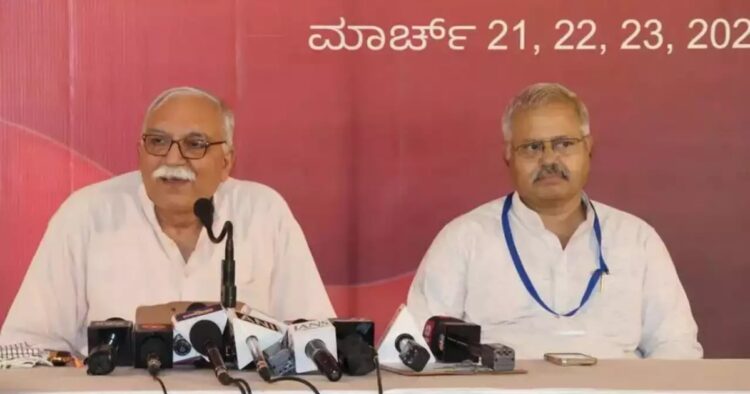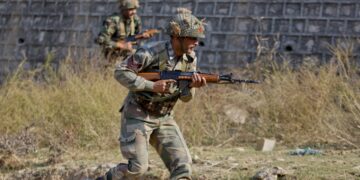The Rashtriya Swayamsevak Sangh (RSS) has raised serious concerns about the increasing violence against Hindus and other minority communities in Bangladesh. At its Akhil Bharatiya Pratinidhi Sabha (ABPS) meeting, the RSS passed a resolution condemning the atrocities and urging international organizations, including the United Nations (UN), to take immediate action.
RSS Warns of Existential Crisis for Hindus
RSS Sarkaryavah Dattatreya Hosabale stated that the Hindu community in Bangladesh is facing an existential crisis due to repeated attacks by radical Islamist groups. He highlighted incidents of forced conversions, destruction of temples, and targeted violence, which have left Hindus living in fear.
The RSS also pointed out the sharp decline in the Hindu population in Bangladesh. According to RSS leader Arun Kumar, the Hindu population has dropped from 22% in 1951 to just 7.95% today. He criticized the Bangladesh government for failing to protect its minority citizens, stating that “perpetrators of these crimes have been emboldened by institutional apathy.”
External Forces Behind Attacks
The resolution also warned about international forces trying to destabilize the region. The RSS alleged that elements from Pakistan and other anti-India groups were playing a role in encouraging violence against Hindus in Bangladesh. It also expressed concerns over growing anti-India rhetoric in Bangladesh, which could harm the strong historical ties between the two nations.
India’s Support for Hindus in Bangladesh
The RSS acknowledged the efforts of the Indian government in raising the issue at multiple international forums. Arun Kumar stated that India is committed to standing with Hindus and other minorities in Bangladesh and has been engaging with the Bangladeshi government on this matter. However, he stressed that more action is needed to ensure justice and protection for the affected communities.
The RSS urged the Indian government to take “all possible steps” to ensure the safety, dignity, and well-being of Hindus in Bangladesh. The resolution also called upon scholars and experts in international relations to expose anti-India activities and external forces working against regional stability.
The RSS strongly condemned the ongoing attacks and demanded that global organizations, including the UN, intervene to stop the violence. It urged Hindus across the world to stand in solidarity with their Bangladeshi brothers and sisters, supporting them in their fight for justice and religious freedom.
As the RSS approaches its centenary celebrations in 2025, it reiterated its commitment to building a strong and united Bharat (India). Hosabale emphasized that the Sangh aims to create a harmonious and organized society, where Hindus can live with dignity and without fear.
The RSS has once again demonstrated its role as a protector of Hindu rights, ensuring that the concerns of persecuted Hindus in Bangladesh are heard at the highest levels. It remains to be seen how the international community will respond to this urgent humanitarian crisis.
Historical Pattern of Persecution in Bangladesh
While the RSS’s concerns are significant, a deeper analysis reveals that violence against Hindus in Bangladesh is not a new phenomenon but rather a long-standing pattern of persecution. Ever since the regime change in Bangladesh, Hindus and other minority groups have increasingly become targets of extremists and Islamists. Reports from human rights organizations indicate that cases of rapes, sexual assaults, abductions, and forced conversions are alarmingly frequent. The systematic vandalization of Hindu homes, the demolition of temples, and the interference in religious celebrations such as Durga Puja are clear indicators of an orchestrated attempt to suppress the Hindu community.
Durga Puja, one of the most vibrant Hindu festivals in Bangladesh, has been repeatedly marred by attacks and destruction of idols, often under the pretext of fabricated accusations. This cycle of violence intensifies around major Hindu religious events, with radical elements using it as an excuse to target minority communities. Despite repeated assurances from the Bangladesh government, justice remains elusive for the victims, and perpetrators often go unpunished.
The consistent decline of the Hindu population in Bangladesh is not just a statistic- it is a testimony to the grave reality of an environment that has made it difficult for Hindus to practice their faith freely. The fear instilled by radical groups has led to the mass migration of Hindus from Bangladesh to India over the decades, highlighting the failure of the Bangladeshi authorities in ensuring the protection of its minorities.
The silence of international human rights organizations and global powers on this issue raises serious questions about selective activism. If similar incidents occurred in other parts of the world, there would be widespread condemnation and intervention. The plight of Bangladeshi Hindus, however, remains largely ignored on the global stage.
In light of these historical patterns, the RSS’s resolution serves as a crucial reminder that action must be taken beyond mere diplomatic discussions. The Indian government’s engagement with Bangladesh on this matter is necessary, but real change will only come when the international community recognizes and acts upon the deep-rooted discrimination that Hindus face in Bangladesh. The call for justice is not just about protecting Hindus- it is about upholding the values of human rights, religious freedom, and regional stability.

















Comments